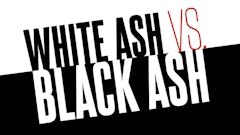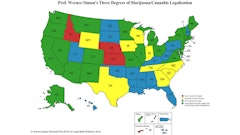
To all those cannabis operators searching for a real estate loan, I first have to wish you good luck. Second, may perseverance be your friend and tolerance of circular reasoning be your default setting. This will become apparent as I walk you through my personal experiences of trying to get a cannabis real estate loan. Hopefully my story imparts some helpful wisdom on some do’s and don’ts and how to size up whether a real estate lender is really a cannabis real estate lender.
What is meant by a “cannabis real estate loan”? Such a loan first and foremost has as its tenant a cannabis company. This can be an owner-occupied property or a traditional lease with a cannabis tenant where the property owner is a separate entity from the operating cannabis company tenant.
The first most important lesson I’ve learned in cannabis: Have your story straight and know how to articulate where you are going with your business.
Given the relatively new nature of this segment of the lending industry, and that nearly all loans are private money transactions, it should be no surprise that not all cannabis lenders are created equal nor look at the world through the same lending criteria lens. As opposed to home loan lenders, who are trying to sell you a commodity and compete on price and service, cannabis lenders are a disparate group of companies and individuals, some of whom resemble the hard money side of income property lending with a dash of almost willful blindness to how the cannabis industry works. (A hard money loan is one that is backed by a hard asset like a property, and because of the low loan-to-value (LTV,) positions the lender to not lose any money if they foreclose.) This is not true in all cases, but in many cases, the lenders have very little insight into how a cannabis business works.
Since the beginning of 2019, I have talked with more than 20 cannabis real estate lenders. Since the journey began, our company has dramatically changed. We have expanded via acquisitions from a grow-only company to include an oil extract subsidiary and recently closed on our first dispensary purchase.
This is important, and brings me to the first most important lesson I’ve learned in cannabis: have your story straight and know how to articulate where you are going with your business.
Even though I mentioned most lenders lack knowledge on how cannabis businesses operate, you are still dealing with smart people, and you have to be able to coherently describe where you are headed. You will get no credit for being thoughtful or sounding credible; but, the opposite will immediately end the lending process. Be sure to explain how, if true, each step in your company’s progression makes the company less risky and more stable from a cash-flow perspective.

A Loan Application Like Any Other
Cannabis loan applications are like any other loan application. You will need bank statements, copies of licenses, permits, leases, and purchase closing statements. There will be forms to fill out, requesting both personal and company information, as well as various waivers to be signed. The application will also include exculpatory language explaining that getting a loan on any terms discussed, or getting a loan at all, is subject to change, and cancellation is possible all the way up to the point of closing.
Now, the most important part of the journey. Say you have a $1 million property and you want 70% loan-to-value (LTV), which is determined by dividing the loan amount by the appraised property value, for a five year term. The lender may present terms that look something like this:
- 1. Loan amount: $500,000
- 2. Maximum loan-to-value (LTV): 50%
- 3. Fees to lender: 4%, also referred to as points, deducted at closing
- 4. Broker fees: 3% or 3 points (if there is a broker involved; there usually is a broker)
- 5. Interest rate (annual): 13%
- 6. Amortization: interest only
- 7. Term: 24 months
- 8. Personal guarantee: yes
This may seem like a straightforward loan quote, but there are plenty of minefields here.
In this scenario, the lender’s LTV is 50% instead of the 70% requested, meaning more financial risk and liability is on the borrower. At 70% LTV, the borrower would be expected to put down 30% of the property value, or $300,000, and the lender the other 70%. The LTV is a lender’s primary protection against loss, but should be a lender’s only protection against loss when the LTV is at or below 60%, as otherwise, much of the financial risk falls on the borrower. (Compare this to many home mortgage loans, which typically have LTVs of 80% or higher, as the borrower is expected to put 20% or less down.)
This quote also includes a personal guarantee, which is when the borrower agrees to personally repay a loan should the business be unable to do so in the event the property goes into foreclosure. This is really a decision each borrower needs to make on his or her own, but I am adamantly against personal guarantees. Combining a personal guarantee with a very low LTV shifts the risk completely to the borrower by causing the borrower to back the loan with all their personal assets, from bank accounts to possessions and other real estate assets. I’ve been in the lending business in prior lives, and one of the things borrowers never realize is that borrowing is a two-way risk analysis, and there is responsibility on both the lender and the borrower. Yes, the golden rule applies —“who has the gold makes the rules”— but not putting yourself into an impossible position will save you headaches later.

There are other things to watch out for. Very few title companies will knowingly issue title policies for properties used for cannabis.
In this particular case, I would counter the lender with a lower loan amount to waive the personal guarantee. Some will do it, some won’t. You may run across the argument, which I have, that the lender knows there is a lot of equity in the property and wouldn’t anticipate the personal guarantee being realized. The lender is actually making your argument for why a personal guarantee is not needed. This is an example of the circular logic I mentioned at the beginning of this article.
Your request for a 70% loan is high for cannabis properties. Other commercial properties not tied to cannabis might qualify for 70%, but cannabis loans via private lenders are very conservative. They, in essence, become hard money loans backed only by the collateral (and personal guarantee, if applicable) at such low LTVs.
Fees to the lender and the broker are always an underappreciated component of cannabis loans. At face value, you might like the 13% interest rate. But lending fees are actually pre-paid interest, and anytime there is pre-paid interest combined with a very short loan term, in this case two years, the actual rate of interest you are paying skyrockets. Without getting into how to calculate annual percentage rate (aka, APR) on this loan, we can just add the percentage points together, 4 to the lender and 3 to the broker, divide by the number of years of the loan (two in this case) and add to the interest rate to get a rough idea of your actual interest rate. In this case the calculation comes out to 16.5%. (4 points + 3 points = 7. Divide by 2 = 3.5. Add 13 = 16.5%) This rate does not account for any costs related to an appraisal, title policy, escrow charges, document charges, and other miscellaneous costs.
To put this in perspective, 16.5% is at least triple what a commercial bank would quote for a regular commercial income property loan (e.g., on a small neighborhood retail center). I’ve been offered loans in the 20%-plus range that also required a personal guarantee. The lenders delivered these terms with a straight face.
Cannabis Lender vs. Lender Who Works in Cannabis
Most lenders say they lend on cannabis properties, but their lending programs do not take into account any value added by the actual cannabis business. Generally, they take their regular commercial underwriting criteria (LTV, interest rate, etc.) and make them more restrictive for the borrower. They take what is already a collateral loan program and grind LTV down, interest rates up, and ask for a personal guarantee. They take no responsibility for learning the industry nor crafting lending programs that facilitate the hum of cannabis commerce.
When vetting lenders, borrowers should interview lenders; it’s not a one-way street where the lender qualifies the borrower. Borrowers will want to have face-to-face or phone conversations with potential loan officers and request a reference or two from borrowers who have successfully closed a loan with the lender. Ask potential lenders if they understand the economics of your particular cannabis business (i.e., grow, retail, processing, distribution) and how their understanding may impact any proposed loan structure. Not only will these questions show the lender you actually understand the cannabis business, the answers will help you decide if the lender is right for you.
Some lenders, of course, are sincere and genuine in their processes and knowledge. But their terms will range all over the map, and almost all will insist on a personal guarantee. There are ways around a personal guarantee that actually help the lender. For example, for bigger loans, putting the property into a bankruptcy remote entity so that if a borrower goes bankrupt, the subject property is not sucked into the bankruptcy—of course taking into account that for a cannabis company to file bankruptcy is difficult, if not impossible, because of the federal nature of bankruptcy. But most lenders shy away from such structures. The securities market that issues commercial real estate mortgage-backed bonds has a lot to teach the cannabis lending market. Unfortunately, the maturity of the market is not yet there.
There are other things to watch out for. Very few title companies will knowingly issue title policies for properties used for cannabis. You can have a willing lender and not be able to find a title company to issue the policy. (This happened to me.) Yet again, your tolerance for circular logic will be tested. I’ve been told by a title company that when they issue a title policy they have to do the escrow. Because the escrow requires them to hold funds related to a cannabis property, they are doing cannabis banking and that is technically not federally legal. Therefore, they cannot issue the title policy. Don’t bother telling them that there are hundreds of credit unions and banks openly banking in cannabis. Even if you find an outside escrow company, the title company will say no. If you suggest that the title company include language that if the cannabis use results in any type of cloud on the title (i.e., an easement) they can exclude that claim, they will still not budge.
So, my journey in search of a real estate loan continues.
There is room in the market for a creative, risk-intelligent, structured, finance-oriented lender, but it appears such a unicorn does not yet exist.
Editor’s note: If you have been successful in obtaining a cannabis real estate loan from a traditional or private lender, we would love to hear your story. Send a note to editor Michelle Simakis at [email protected].
Loren Picard is CEO of High Desert Flower Inc., a vertically integrated cannabis company located in Oregon. He has spent decades in the financial services industry, including managing a $1 billion portfolio of structured commercial real estate debt, managing real estate lending platforms, consulting for public companies, advising on product development for financial technology firms, and in his early life worked as a programmer and systems analyst. He can be reached at [email protected].

























